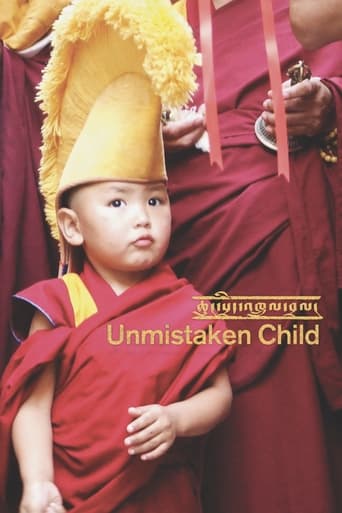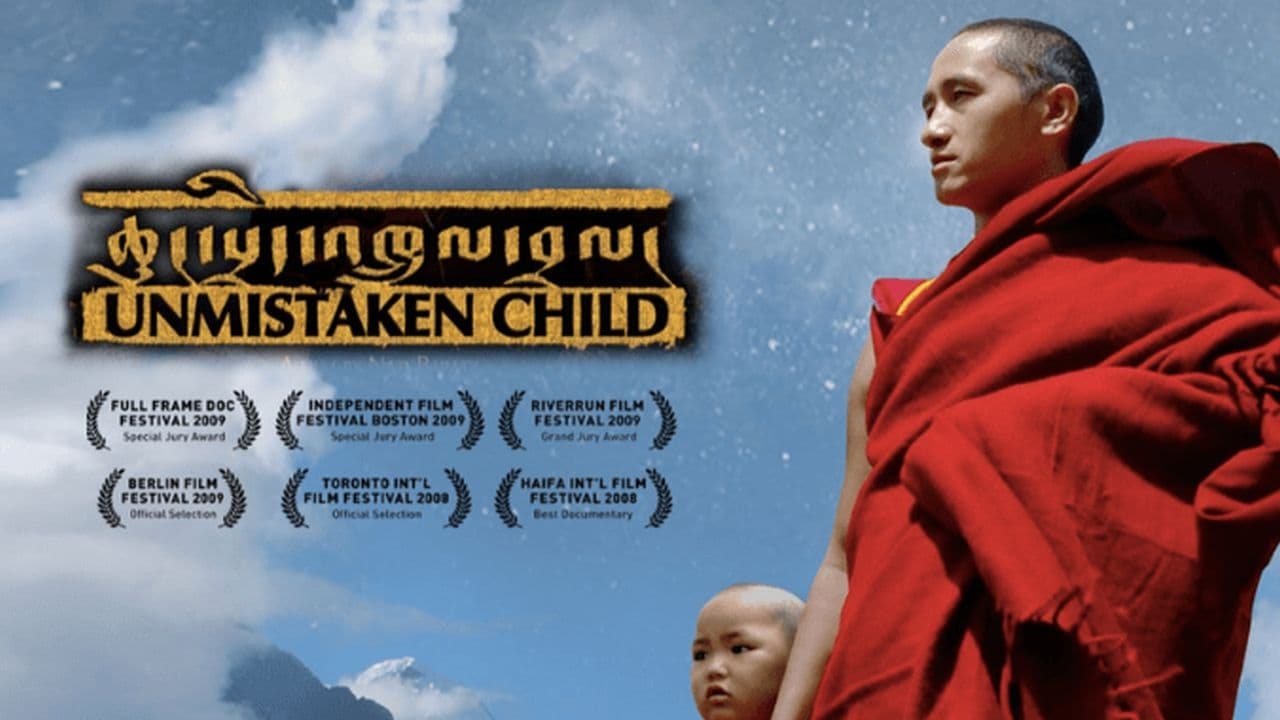runamokprods
Complex. moving, thought provoking and beautifully shot, with a great score.I struggled a bit philosophically at first while watching, since I've been trained in a more western tradition of Buddhism, and don't take the concept of reincarnation literally. And I had an even harder time seeing a tiny child taken from it's family with no say as to his fate. But then I realized that the documentary – which is told without narration – isn't taking sides on whether reincarnation is real, whether this child actually is the reincarnation of the former llama (there are some moments that seem to actively raise question, where it looks like the boy may being guided to give the right answers). It's simply displaying a way of life and a tradition that has gone on for hundreds of years. One that includes the cruelty of separating a child and his family, but that has also led to such important figures as the current Dali Llama, who has done so much for world peace. And, in turn that leads to bigger, important questions about how we raise children. If we never forced children directions against their will at times, we might never have some of our greatest figures in religion, leadership, arts, etc. But in doing so, do we also in some way harm the soul of that child? Where is the line between freedom and tradition? These are important questions, and the film raises them with skill and grace, without attempting to force an easy answer.It's also the very emotional journey of the young monk charged with the difficult and uncertain task of finding the reincarnation of the man he loved and served for many years. Whether your beliefs, you can't help but care for this charismatic and vulnerable monk on his physically, emotionally and spiritually challenging journey.
Michael Day
To what degree do we have a duty to society at large? This is one of many questions that are likely to stir in your mind when reflecting on this film. What more could you ask of a documentary except that it expand your knowledge of the world and make you think more about what you already knew and what it means, all while showing you inspiring footage of some of the most dramatic landscapes our planet has to offer?Simply told, cleanly edited, with little cinematic analysis and no pedantic voice-over Unmistaken Child presents a fascinating view into Tibetan Buddhism very worth seeing.And unless you have a trip to Nepal or Tibet scheduled for the near future, see it on the largest screen possible. The dramatic landscape plays a very strong supporting role to the true dramatis personae - the culture nurtured in its valleys beneath the roof of the world - and the social reality that unfolds in this unique region.
John Kirk
***SPOILERS AHOY!*** Writing as a practising Buddhist, I saw this gem on TV late one night (it was actually shown on BBC4 as 'The Baby and The Buddha', so watch out for it). Other reviews commend the beauty and emotion of the film, the breath-taking landscapes, and while these are all indeed true, it was the 'affirmation' that touched me most. Let me explain what I mean... Firstly let me apologise for putting such a heavy Buddhist slant on this; I'm hoping there are like-minded people out there who can appreciate what I'm about to say! If not and you're just curious, thanks for looking! OK, here we go.... Watching the child react to being given the Rosary Beads that were his in the previous life, and how he puts them around his neck and won't be parted from them; his reaction to the finger drums, the bells etc of that earlier life; how he shows an unshakable confidence and authority when granting blessings to his disciples, and so on. I found this to be very jarring to watch, and it has been an enormous inspiration to my Dharma practise (following the Buddhist Path). Us 'Westerners' have and will always struggle with the Buddhist belief of Rebirth, and the conditions that naturally arise from this (such as the existence of the 6 Realms, Mother- Beings, etc), but this superb film spells out to us that these aren't just mystical traditions, but ACTUAL occurrences. What better proof do our inquisitive and questioning minds need? Think about it. If you watch the film with a sincere heart, you will become convinced that the child is indeed the Buddhist Geshe reborn, or a 'Rinpoche'. Therefore, rebirth at the end of this life will definitely happen for us all, and it follows that it HAS happened to us countless times before. My Wife struggles with a lot of these concepts, but now I have actual proof to wave under her nose! It's up to us 'Westerners' to suspend our disbelief, and embrace this seemingly far-fetched idea as actual fact. That is why I feel that this film is so important. In the film, Geshe-La was reborn in a Human form because of his life-long devotion to the Three Jewels; if we follow the example ourselves and practise Dharma purely and sincerely (as lay-persons like me, not necessarily as fully ordained Monks) then we will surely be reborn in the Human Realm, and have the precious opportunity to continue our Dharma practises. So, that's what I meant when I said that I found the film to be 'affirming'. It strengthens one's faith in the Buddhist belief of Rebirth, which then inspires one's study of Dharma, and in taking Refuge in the Three Jewels. Amazing stuff. Every Buddhist should own a copy. Go to Amazon and click the buy button RIGHT NOW!!!! lol Thanks for reading :-)
dumsumdumfai
By far, this doc is as standard as you get. And it has no gimmicks. Everything is chronological. No heavy voice over narration. It lets the story tell itself - the most traditional kind.The camera follows the journey of a Tibetan monk in search for the reincarnation of his master. The pressure is overwhelming to say the least. He is given some clues and it is interesting to see the very argumentative confirmation process. But the subject and journey is interesting. You see the crucial points coming, you anticipate them yet it is more than what you can imagine - simply because it is not dramatic - because most of the time, the people involved holding down some of their feelings.This remarkable film seems to have followed a quest from 2001 to 2005 or 2006. and only ending editing 2 weeks ago. To have traveled so far for so long but presented a story with so much dignity and humility is an achievement in itself - to have a soul almost.*spolier* one key passage (the director alluded to this as well) is the taking away of the child. and what the parent, particularly the father, commented on.This reminds me of Weeping Camel' doc film I saw a few years back. It seems to have that same soul. The film does not call attention to itself but to and respect of its subjects.Substance is not about quantity; and depth is not always complex - but maybe about a journey or a certain truth.During Q&A the director also mention it took a long time for the Monks to trust what he is doing.



 AD
AD
